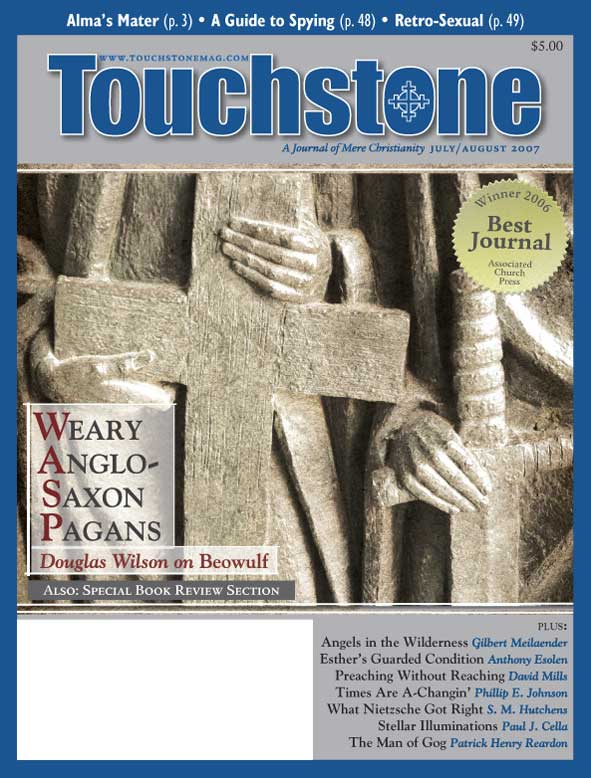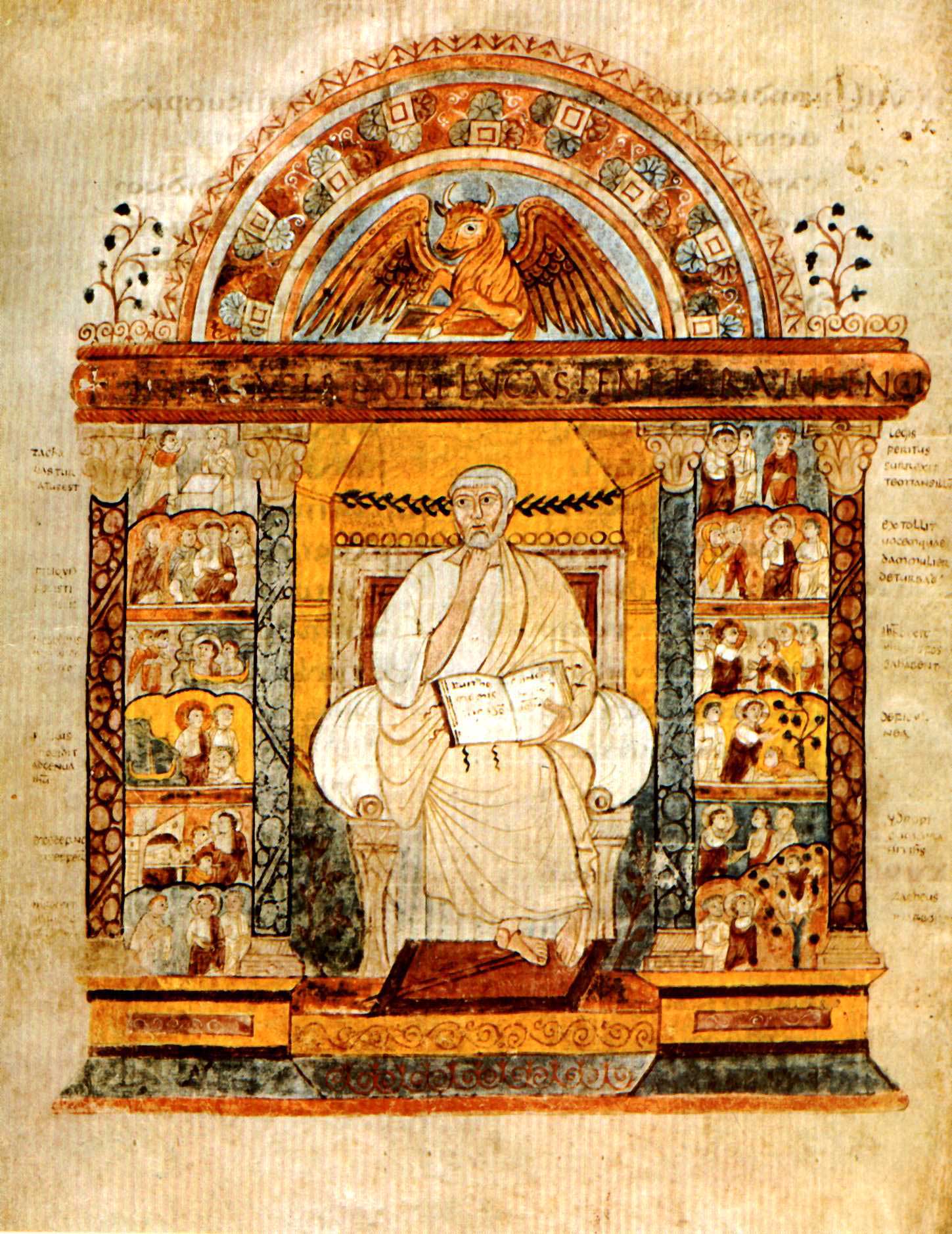Esther’s Guarded Condition
Dying When Common Sense & Common Decency Have Departed
by Anthony Esolen
As his days were racing to an early end, my father had to discuss with his doctors all the “choices” available for treatment. Sometimes these were legitimate choices involving the weighing of commensurate goods or commensurate evils, each with different degrees of probability. But once it became clear that he was going to die, that there was nothing that medicine could do to heal the bile duct and its spreading and thickening cancer, the doctors lost interest in his case.
They were kind to him, but they wanted him to make the choices—to take responsibility for the treatment. Finally, at one point, he threw up his hands in exasperation. “Why are they asking me what I think?” he said. “What do I know about it? I was an insurance salesman!”
Lucky it was for my father that he was in possession of all his faculties, and that he was a man of strong faith and will. But what happens when you are bedridden and unconscious, and your death is imminent?
“Right” Choices
I’ve seen a little of what happens only recently, attending with my wife Debra and her father at the bedside of her dying mother, long afflicted by a slowly progressing senility, the result of many small strokes. But the last two strokes—massive and irremediable—had left her mainly comatose, unable to swallow, and clearly on the path to the grave.
Debra and I had driven from Rhode Island to Pennsylvania to be with Grandma and to assist her husband in making sense of the reports and the demands, veiled as choices, made by the doctors. For my mother-in-law Esther was already uninteresting to the great god of Medicine.
She was going to die. We knew it, and had accepted it. But although she was in the care of people who were generally kind and considerate of her weakness and our grief, subtly the medical care of this dying life had shifted into the realm of personal choice, personal desires—and professional insistence, sometimes quiet, sometimes not so quiet, that the “right” choice be made, and fast.
We did not at first know how long she had left to live, and it was conceivable, at least for the first two days, that she would recover the ability to swallow. Therefore we asked that she be given nourishment intravenously.
It was not an unreasonable request—moreover, it was not a request we should have had to make. It should have been a foregone conclusion. There should really have been no “choice” at all, neither ours, nor the doctors’, nor even the patient’s. If somebody is going to die of hunger, you feed him.
“But consider her quality of life,” said one of the doctors, phoning from the nursing home that had taken care of her during her last few years.
“Quality of life,” Debra replied, “has nothing to do with it.”
“But the nurses here tell me they were at their wits’ end trying to take care of her.”
“That’s why they are paid their wages,” said my wife, growing testy. “Are you telling me now that my mother is brain-dead?”
“No, she’s not brain-dead, unfor—,” groaned the doctor, checking himself.
The Doctors’ Hope
So it went on for ten days, choice after choice, with the doctors and nurses and social workers hoping, sometimes impatiently, that we would let them get it over with.
Please do not suppose that we sinned against charity by begging for heroic and expensive measures. During her fourth night in the hospital, Esther apparently suffered another stroke, and all attempts to feed her a little bit of mush in a spoon were out of the question. She would aspirate the particles of food, and they would cause congestion in the lungs. Then we called a halt to those minimal attempts—for a perfectly medical reason.
But when it became clear that she was growing dehydrated, we asked for a simple intravenous drip to give her a little water; one shot-glass an hour was about all her body could take, without risking congestion in the lungs and consequent pneumonia. Again, this was a medical decision, a perfectly ordinary thing, and not a “choice” that involved profound moral philosophy.
As I explained to a social worker, “You have somebody dying in bed. You know he’s going to die. But he has a sore on his knee, and there’s pus in it. So you spread some antibiotic ointment on the sore. It’s right there, it’s easily treated. You treat it. We know she’s dying of stroke, but why should she die of dehydration?”
It did require a tense conversation between us, a nurse, and a kindly lady chaplain, who said, “You have to understand that it is important to the faith of these people that she be given water.” That helped; it flipped the sacred switch.
In a sense she was correct, but in a sense she wasn’t, either. Our faith does require us to give a drink of water to somebody who could use a drink of water, but only because the plain dictates of human reason demand it. There really was nothing to “believe” here, nor any personal preference.
So they agreed, reluctantly. It helped that Debra had a billy club in reserve: Esther’s power of attorney. But they weren’t too attentive to what they were doing, and for a day they gave her too much water and had to discontinue it for a while. Her lungs began to rattle and wheeze. The breathing was deep and labored, from thirty to forty respirations a minute. That brought the night nurse, and another “choice.”
“I have to get her respirations down,” she said. “She’s in distress. We’ll start her on a morphine drip.”
Now I had heard from my sister, a physician who specializes in infectious diseases, about the uses of morphine for regular and unreported euthanasia in our hospitals. Morphine does calm the respiratory rate and the heart rate. It calms them by suppressing them. But there’s a reason why your body may take thirty breaths a minute. It’s that it needs thirty breaths a minute.
To give morphine to someone who is already having trouble breathing is to suffocate him, slowly, easily, calmly. It is to place a pillow over his nose and mouth and press down. The difference is that with morphine one needn’t be burdened with the physical memory of the jerking hands and feet as the body kicks into one long spasm for survival.
An Honor Declined
We’re not categorically opposed to morphine, understand—when there is a medical reason for it. If someone is going to die, and is in great pain, and relief from the pain can be had in no other way, then it is indeed a medical act to administer morphine. But what pain was Esther really in? I called my sister immediately, and asked her advice.
“She’s unconscious, she’s not moaning, she’s not restless. There’s discomfort in her breathing, but it’s discomfort for the onlookers, not for her. There’s no reason to give the morphine. When I started in medicine, nobody ever gave it to dying patients in these circumstances. Even ten years ago you hardly ever saw it.”
When the nurse returned, we declined the honor. Her face hardened a little, but after Debra noted that though we did not believe in prolonging at all costs an inevitable death, we also did not believe in hurrying the dear departing over the edge, she knew she was beaten. “It’s going to be a long night,” I said.
“Or couple of nights,” said the nurse, unwittingly giving away the ballgame.
Sure enough, after a night and a day, wonder to behold, Esther’s breathing grew much calmer. The rattle disappeared; no more puffing through the cheeks. She lay as it were asleep, and though she breathed more frequently than someone who was healthy, still the respiratory rate slowed considerably, as her lungs cleared up their temporary congestion.
“What did I tell you?” said my sister.
We did earn the respect of some of the staff at the hospital, by our making sure that somebody was with Esther pretty much day and night. Again, this wasn’t meant to be heroic. We simply thought that someone should be with her as she died, and what we were told suggested that her death was always a matter of hours, at most a day or so.
Sometimes my wife and I took turns sleeping in a nearby room reserved for families; sometimes I advised her that we had to go home and get some real sleep, no matter what. To us this was not a “choice”—it was simply the thing to do.
Lest it be said that the loved one, in a coma, cannot appreciate the company, I can only say that I don’t know that. Having never myself been in one, I have no idea what a voice can do for the dying—Debra singing hymns to her once as her eyes opened, or just the idle chatter of the three of us as we watched Gunsmoke on the television overhead.
Who knows but that there might not filter into the mind the grace notes of love and duty? We didn’t know; no one can know. But in a sense it is beside the point. Esther was dying, and our place, if possible, was at the bedside.
You Must Choose
Rather early in the final week we were advised that, since medicine could not cure her, we should put her under hospice care. We agreed to this, under the condition that she might be given water intravenously and, if she were attacked by a simple infection, some antibiotics.
We also didn’t want her to be jolted about in a move. Esther was never a large woman, and in her last days she had dwindled to just seventy pounds. The hospice care would be given in the hospital itself, in the same room where she had been placed.
Now, the idea of a hospice, a comfortable place where the dying can be tended in their final days, their clothes changed, their mouths moistened, or even a little food given, is a fine thing, certainly better than the noisy and necessarily grim atmosphere of a hospital ward. But the possibility of choosing a hospice has been transformed into necessity. Since you can choose a hospice, you must choose a hospice, or else pay exorbitant costs, and this, too, regardless of the needs of the hospital (there were plenty of beds available on all the floors) and regardless of the level of care given.
When Esther had shocked everyone by living for a week—one of the doctors motioned with disdain toward “that thing,” the intravenous drip, the culprit that set everybody’s time calculations awry—the social worker in charge of the hospice service within the hospital invoked The Rules. They state that if you don’t die soon enough, you must be moved into a regular hospice, unless a doctor gives a medical order forbidding it.
Esther was now very near death. When she opened her eyes, there was no longer any light in them; she could not see. The breath, now shallower, would make a slight humming noise as it forced its way through the throat. It was absurd to move her. “Do you need the bed?” I asked the doctor.
“No, not really. But this is an acute care facility,” he said.
“Yes, I understand that; but what is the medical point for the move?”
“Well,” he said, lying, “we want to give her the best care possible.” This was simply untrue; the most they could say about the hospice to which they wished to transfer her was that it offered the same care. Frankly, they just wanted to be rid of us.
This time they weren’t going to back down, and they assured us that the move would be no more disruptive than her regularly scheduled turnings on the bed (which turnings did cause her a certain stress). We were exhausted; the doctors had their way. When we finally caught up with her at the hospice, she had changed markedly for the worse.
Again we fought off the morphine. Again we struggled with a doctor, this one insisting on knowing what was in Esther’s Living Will. “Everybody should have a Living Will,” he said, with the enthusiasm of a believer. “These days you can specify exactly what you want in exactly what circumstances—you can even specify that you want the Bible read to you, and people would have to do it!”
A nightmare of choice; what is left when common sense and common decency have departed, and desiderata are drawn up in the dark; the legal in place of the human; choices and wishes in place of duty.
But the struggle came to an end. Twenty-four hours later, Esther expired.
Esther’s Worth
As I think back upon these events, it occurs to me that what we really needed from the doctors and nurses were some fairly humble services. We did not need them to be moral philosophers. They make pretty inept philosophers. We wanted them to be the medical equivalent of plumbers and janitors.
We also wanted them to be human beings, reacting in a human way to the mystery of death before us, and to the incomparably precious life ebbing away upon the bed. If they could not manage that—if they could not in ten days muster the least interest in that life, not enough to ask what she once was (the person who put the m’s on the m&m candies), or what she was like as a mother (fiery, fiercely loyal, generous to a fault, free-spending, difficult to live with, quick to find fault, quick to forgive), or what she believed (she finally set aside her embarrassment and asked to be baptized, years after the Alzheimer’s had begun, and dangerously close to the time when she would no longer be able to remember that she had asked for anything)—then they might at least leave us alone. Well, they did often leave us alone, and for that we were genuinely grateful.
But instead of having the time, and the freedom, to come to terms with the woman who lay helpless before us, whose body still took in the breath of life, but whose mind was fading away, we were mosquito-ridden with false choices, with non-medical considerations, with the intrusive ennui of the helpers. What could have been a few days of peace was shot through with fretting.
Our experience, no doubt, was nothing like what many others have had to go through, sometimes actually battling for the lives of loved ones whose death was not inevitable—and my sister has plenty of stories about that, too. It was enough, though, to make me see that, in a hospital, dying life means very little.
Esther could not do anything; she was not going to get better; she might indeed have been, upon admission, past the point at which she could recognize a visitor. So what was it worth, this dying life?
And there is the nub of the matter. It is what the Prince of Choice does not tell us. Beneath the assertion of choice, beneath the assumption that I may dispose of my life or my body (or my loved one’s life or body) as I please, lies the whispered irony, “And it does not matter much anyway.” When I can no longer exercise that vaunted choice, when I lie incapable of any recognizable action, mental or physical, then I do not count.
As All Things Do
Esther lay upon the bed, breathing, perhaps dreaming, perhaps not. Perhaps, for the last few days, she was doing only that fundamental thing that all created things do, animate and inanimate, sentient and insentient; she was simply being.
Not enough for the barbaric enlightened, maybe. But for the One whose most intimate name is “I AM,” who we trust has taken that little woman into the depths of his being, it was, I think, enough. •
Everlasting Arms
I stood by the bedside with my wife and her father, as the last of many strokes ended her mother’s life. Esther took her last breath, and then after a few moments her pulse was no more. “Come away,” I said to my wife, as we left the room, instructing the nurses to remove the oxygen mask and to close her eyes.
At one moment, Esther lay in bed, breathing slowly and quietly; if she was doing nothing else, she was being. And then there was no “she,” not in this world of time and change.
All Changes
The faithful Christian will say that this grandmother of my children, this woman who turned to the Lord almost at the last moment, was in heaven, and, if it should please the mercy of God, that would be correct. But we who live in a world of time and change can only with difficulty speak about a world beyond decay, a time outside of time, nor can we really fix in our minds any clear image of it.
Even this world eludes our grasp. Where are the snows of yesteryear? Where is the youth we once enjoyed? Of the loved ones who came to Esther’s funeral, some had gone entirely gray; some were stooped with age; children had grown up. All had changed, and I know that they looked at my wife and me and thought the same thing. And one, of course, had changed from life to death.
Without God, change is only a decline into death and oblivion. No sentimentality here, please, about “making a difference” and “being remembered” and “living on in a legacy,” and no mendacious theology that denies the resurrection yet patters about some sort of “eternal life” in the here and now.
At least the materialist Lucretius was honest: You could live a hundred years, he said, but for what?
Nevertheless eternal death awaits,
Nor will the man who died with the sun today
Be nonexistent for less time than he
Who fell last month—or centuries ago.But Lucretius was wrong. He understood the nature of the pagan gods, and rejected them. He did not understand the God of infinite goodness; he could not conceive of a creator closer to each of us than we are to ourselves.
A creature of time and change, I don’t know what heaven is like, which is only another way of saying that I have not seen God face to face. But all Christians have seen the face of Christ, and whoever sees Jesus, sees the Father.
Jesus reveals to us the Father who gives good things. To all species of creatures he gives the fullness of good things that they, by their nature, can enjoy. If my terrier lived for a thousand years, she would never be happier than she already is when she walks with me along a path through the woods, dashing about from rock to tree.
Should man, then, who can conceive of God, whose mind reaches before and after, whose joy is in knowing the truth, and who longs to meet that Truth face to face, be deprived of his full measure of good, unless he should foolishly cast it away?
Never Lost
Even the ancient Hebrews, who, we are told, had no definite sense of eternal life, still placed their trust in him, both in life and in death. “Should I go down to Sheol,” says the Psalmist, “yet you are there.” Those words ring out with courage and faith.
They are also quite reasonable. In no place can I be lost by the God who created place; in no time can I be forgotten by the God who created time. The Father will neither lose nor forget one he has made, one his Son has saved, not even an old woman named Esther, who died in a little hospice in eastern Pennsylvania in early February, while the snow still lay on the ground.
— Anthony Esolen
Anthony Esolen is Distinguished Professor of Humanities at Thales College and the author of over 30 books, including Real Music: A Guide to the Timeless Hymns of the Church (Tan, with a CD), Out of the Ashes: Rebuilding American Culture (Regnery), and The Hundredfold: Songs for the Lord (Ignatius). He has also translated Dante’s Divine Comedy (Random House) and, with his wife Debra, publishes the web magazine Word and Song (anthonyesolen.substack.com). He is a senior editor of Touchstone.
subscription options
Order
Print/Online Subscription

Get six issues (one year) of Touchstone PLUS full online access including pdf downloads for only $39.95. That's only $3.34 per month!
Order
Online Only
Subscription

Get a one-year full-access subscription to the Touchstone online archives for only $19.95. That's only $1.66 per month!
bulk subscriptions
Order Touchstone subscriptions in bulk and save $10 per sub! Each subscription includes 6 issues of Touchstone plus full online access to touchstonemag.com—including archives, videos, and pdf downloads of recent issues for only $29.95 each! Great for churches or study groups.
Transactions will be processed on a secure server.
more from the online archives
calling all readers
Please Donate
"There are magazines worth reading but few worth saving . . . Touchstone is just such a magazine."
—Alice von Hildebrand
"Here we do not concede one square millimeter of territory to falsehood, folly, contemporary sentimentality, or fashion. We speak the truth, and let God be our judge. . . . Touchstone is the one committedly Christian conservative journal."
—Anthony Esolen, Touchstone senior editor









